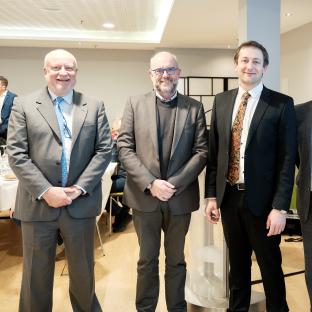Alzheimer Europe held its first lunch debate of 2019 in the European parliament on 26 February 2019, focusing on dementia as a European research priority. Hosted by Anneli Jäätteenmäki MEP, the debate was attended by 64 delegates from across Europe, including the Chair of the European Working Group of People with Dementia (EWGPWD), national Alzheimer’s Associations, research partners, pharmaceutical representatives and members of the European Parliament.
The Executive Director of the Innovative Medicines Initiative (IMI) Pierre Meulien, presented on the work of IMI through both its iterations IMI1 (2008-2013) and IMI2 (2014-2020), highlighting that the public-private model of funding had yielded over EUR 5 billion euros investment, with over EUR 300 million invested in brain disorders and over EUR 200 million invested in drug discovery to date. Dr Meulien further identified the shift in approach to include molecular mechanisms, acknowledging that the previous focus on disease-modification in the symptomatic stages of neurological conditions, including dementia, had not been effective. As such, the overarching approach to neurodegenerative conditions focused on four key areas: Underlying causes, populations at greatest risk, improved clinical trial design and brain scanning as a means to improve detection and treatment. Additionally, the value of “big data” projects were also explored within the presentation.
Mikka Hiltunen, Professor of Tissue and Cell Biology at the Institute of Biomedicine, University of Eastern Finland (UEF), presented on current research being carried out within his institute concerning brain health in the older population, with a specific focus on biomarkers as a means of prevention and early detection for dementia. Prof. Hiltunen explained that understanding the genetics of Alzheimer’s disease was one of the best ways to improve knowledge on the condition. He further outlined the AlzTrans project, which seeks to evaluate the translational aspects, feasibility and applicability of novel AD-associated risk genes/variants, as well as Finland’s involvement in international research collaborations. This included the EU’s Joint Programme on Neurological Diseases (JPND), which involved the European DNA Bank for deciphering the missing heritability of Alzheimer’s disease, whcih collated ~40,000 patients and ~66,000 controls from 13 countries.
Stephane Hogan, Head of Sector for Neuroscience in the Directorate General Research and Innovation at the European Commission, highlighting the EU’s support for dementia research in Europe. Mr Hogan provided an overview of the approach of the European Commission across six areas, including molecular pathogenesis, epidemiology, prevention, diagnosis and monitoring, treatment, and care and support. He also articulated a number of projects across these areas including AETIONOMY, ADDIA and PRODEMOS, as well as collaborative programmes such as JPND and IMI. In addition to being a major funder of research, Mr Hogan noted that the role of the EU included supporting frontier research, providing a network of collaborative projects, as well as providing a framework for efficient research coordination between EU countries. Concluding, Mr Hogan also highlighted that the future Horizon Europe and the novel aspects of the forthcoming programme, including specific research missions and an “open science” approach.
Alzheimer Europe Chairperson, Prof. Iva Holmerova, thanked the speakers, MEPs and attendees for taking part in the lunch debate and officially launched two reports by Alzheimer Europe. The first, “The development of intercultural care and support for people with dementia form minority groups”, was the result of an extended piece of work undertaken with the support of partners across Europe, exploring how dementia was experienced by minority communities. The report highlights the need for specific considerations, particularly as cultural differences in the understanding, status and position of dementia, may increase the stigma associated with dementia. Particularly interesting are the recommendations. The second, the Dementia in Europe Yearbook 2018, provides a comparison of national dementia strategies across Europe, comparing the content and policy priorities set out in each document across Europe. The report highlights the strong focus on systems of care and support for people with dementia, whilst also noting the frequency of other areas, such as research, training for professionals and awareness raising.
The session was concluded by an open floor discussion, with questions from attendees on a range of subject matters including forthcoming Horizon Europe research programme, the place of dementia within the research missions, the role of central and eastern European countries in the research agenda and the future of collaborative approaches to research (e.g. IMI3).
